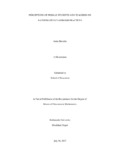
Please use this identifier to cite or link to this item:
https://hdl.handle.net/20.500.14301/272| Title: | PERCEPTIONS OF FEMALE STUDENTS AND TEACHERS ON MATHEMATICS CLASSROOM PRACTICES |
| Authors: | Shrestha, Anita |
| Citation: | Shrestha, A.(2012).Perceptions of female students and teachers on mathematics classroom practices. |
| Issue Date: | Jul-2017 |
| Publisher: | Shrestha, A.(2017).Perceptions of female students and teachers on mathematics classroom practices. |
| School: | SOED |
| Department: | DOSE |
| Level: | Masters |
| Program: | Master of Education in Mathematics Education |
| Abstract: | As a student of mathematics, I have always been noticing low enrollment of female students in mathematics. It kept me provoking: made me curious about the perceptions of female teachers and students towards mathematics, which further led me ponder why there is less involvement of females in mathematics. The purpose of my research was to investigate how female students experience mathematics, and examine the various disempowering forces in mathematics through teachers’ and students’ perspectives. The research questions of my research are, “How do female mathematics students/teachers sensitize/perceive mathematics and what sort of disempowering forces arise in the context of females?” Feminism was the major theoretical referents aiming to address the taken-for granted social, economic, cultural, and political assumptions and concepts in the study. The critical ethnographic approach helped me to critically assess the issues, and land with some useful insights. In Nepal, mathematics is taken as the abstract subject ii in school level, so only few students tend to like mathematics. In case of female students, the situation is even worse in terms of enrollment. To investigate the possible reasons behind this, one female teacher and three female students were selected as the principal research participants for in-depth interview and groups of students were selected for the focus group discussion. Trustworthiness, pedagogical thoughtfulness, praxis and critical reflexivity were the major quality standards. The research aims to present how Nepalese female students and teachers experience school mathematics and what are the disempowering reasons for females in mathematics learning process. Two female students out of my research participants experienced mathematics as a difficult subject and consider to be learnt only by few “talented” students whereas rest two participants felt mathematics as an essential portion of our day to day activities so mathematics is considered to be practical subject. Various disempowering forces like negative beliefs about mathematics, math phobia and role of parents/teachers played major role in formation of females’ perception on school mathematics. A syllogism drawn through this research is that mathematics can be easy for some female students whereas difficult for other. Some strongly believe that females shouldn’t be considered to be inferior in mathematics. Female students are explicitly influenced by the environment provided by teachers and parents. They are the sturdiest factors who are responsible to dis/empower females in mathematics. In the present context, both parents and teachers should be able to address the interests of the learners so that they become able to explore themselves in the field of mathematics |
| URI: | https://hdl.handle.net/20.500.14301/272 |
| Appears in Collections: | Dissertation |
Files in This Item:
| File | Description | Size | Format | |
|---|---|---|---|---|
| Anita Final Correction-_Anita.pdf | 895.26 kB | Adobe PDF |  View/Open |
Items in DSpace are protected by copyright, with all rights reserved, unless otherwise indicated.